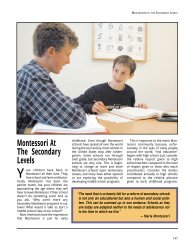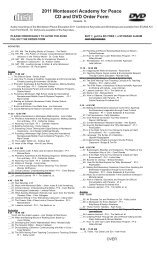Tim Seldin & Paul Epstein Ph.D. An Education for Life
Tim Seldin & Paul Epstein Ph.D. An Education for Life
Tim Seldin & Paul Epstein Ph.D. An Education for Life
You also want an ePaper? Increase the reach of your titles
YUMPU automatically turns print PDFs into web optimized ePapers that Google loves.
Freedom is a second critical<br />
issue as children begin to explore.<br />
Our goal is less to teach them<br />
facts and concepts, but rather to<br />
help them to fall in love with the<br />
process of focusing their complete<br />
attention on something and<br />
mastering its challenge with enthusiasm.<br />
Work assigned by adults<br />
rarely results in such enthusiasm<br />
and interest as does work that<br />
children freely choose <strong>for</strong> themselves.<br />
The prepared environment of<br />
the Montessori class is a learning<br />
laboratory in which children are<br />
allowed to explore, discover, and<br />
select their own work. The independence<br />
that the children gain is<br />
not only empowering on a social<br />
and emotional basis, but it is also<br />
intrinsically involved with helping<br />
them become com<strong>for</strong>table and<br />
confident in their ability to master<br />
the environment, ask questions,<br />
puzzle out the answer, and learn<br />
without needing to be “spoon-fed”<br />
by an adult.<br />
What if a Child Doesn’t<br />
Feel Like Working?<br />
While Montessori students are allowed<br />
considerable latitude to pursue<br />
topics that interest them, this<br />
freedom is not absolute. Within<br />
every society there are cultural<br />
norms; expectations <strong>for</strong> what a student<br />
should know and be able to<br />
do by a certain age.<br />
Experienced Montessori teachers<br />
are conscious of these standards<br />
and provide as much<br />
structure and support as is necessary<br />
to ensure that students live up<br />
to them. If <strong>for</strong> some reason it<br />
appears that a child needs time and<br />
support until he or she is developmentally<br />
ready, Montessori teachers<br />
provide it non-judgmentally.<br />
What about Children with<br />
Special Needs?<br />
Every child has areas of special gifts, a<br />
unique learning style, and some areas<br />
that can be considered special challenges.<br />
Each child is unique. Montessori<br />
is designed to allow <strong>for</strong> differences.<br />
It allows students to learn at<br />
their own pace and is quite flexible in<br />
adapting <strong>for</strong> different learning styles.<br />
In many cases, children with mild<br />
physical handicaps or learning disabilities<br />
may do very well in a<br />
Montessori classroom setting. On the<br />
other hand, some children do much<br />
better in a smaller, more structured<br />
classroom.<br />
Each situation has to be evaluated<br />
individually to ensure that the program<br />
can successfully meet a given<br />
child’s needs and learning style.<br />
Wasn’t Montessori’s Method First<br />
Developed <strong>for</strong> Children with<br />
Severe Developmental Delays?<br />
The Montessori approach evolved<br />
over many years as the result of Dr.<br />
Montessori’s work with different<br />
populations and age groups. One of<br />
the earliest groups with which she<br />
worked was a population of children<br />
who had been placed in a residentialcare<br />
setting because of severe developmental<br />
delays.<br />
The Method is used today with a<br />
wide range of children, but it is most<br />
commonly found in settings designed<br />
<strong>for</strong> normal populations.<br />
Is Montessori Effective<br />
With the Very Highly<br />
Gifted Child?<br />
Yes, in general, children who are<br />
highly gifted will find Montessori to<br />
be both intellectually challenging and<br />
flexible enough to respond to them<br />
as a unique individuals.<br />
PARENTS’ QUESTIONS &ANSWERS<br />
Is Montessori Elitist?<br />
No. Montessori is an educational philosophy<br />
and approach that can be found<br />
in all sorts of settings, from the most<br />
humble to large, well-equipped campuses.<br />
In general, Montessori schools<br />
consciously strive to create and maintain<br />
a diverse student body, welcoming<br />
families of every ethnic background and<br />
religion, and using scholarships and<br />
financial aid to keep their school accessible<br />
to deserving families. Montessori<br />
is also found in the public sector as<br />
magnet public school programs, Head<br />
Start centers, and as charter schools.<br />
Does Montessori Teach Religion?<br />
Except <strong>for</strong> those schools that are associated<br />
with a particular religious community,<br />
Montessori does not teach religion.<br />
Many Montessori schools celebrate<br />
holidays, such as Christmas, Hannukah,<br />
and Chinese New Year, which are religious<br />
in origin, but which can be experienced<br />
on a cultural level as special<br />
days of family feasting, merriment, and<br />
wonder.<br />
The young child rarely catches more<br />
than a glimmer of the religious meaning<br />
behind the celebration. Our goal is to<br />
focus on how children would normally<br />
experience each festival within their culture:<br />
the special foods, songs, dances,<br />
games, stories, presents — a potpourri<br />
of experiences aimed at all the senses of<br />
a young child.<br />
On the other hand, one of our fundamental<br />
aims is the inspiration of the<br />
child’s heart. While Montessori does not<br />
teach religion, we do present the great<br />
moral and spiritual themes, such as love,<br />
kindness, joy, and confidence in the fundamental<br />
goodness of life in simple ways<br />
that encourage the child to begin the<br />
journey toward being fully alive and fully<br />
human. Everything is intended to nurture<br />
within the child a sense of joy and<br />
appreciation of life.<br />
235




